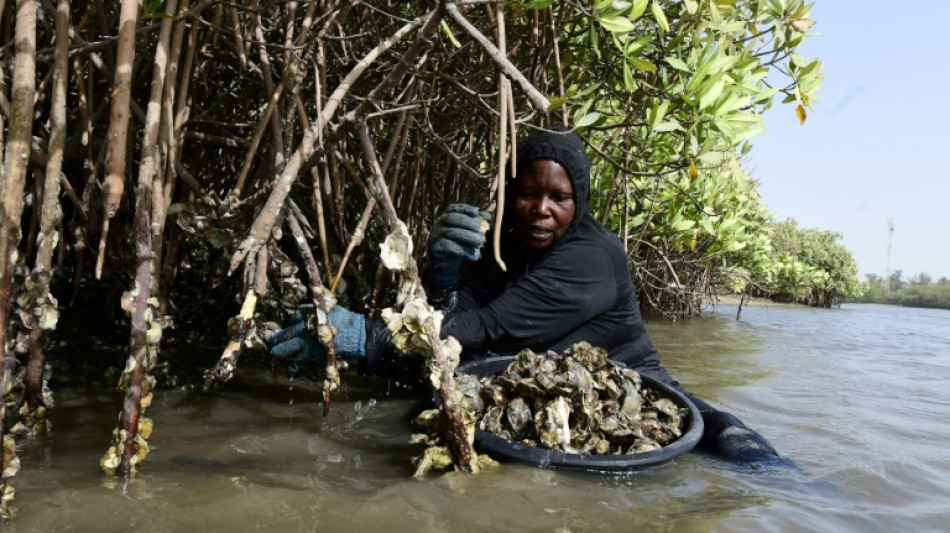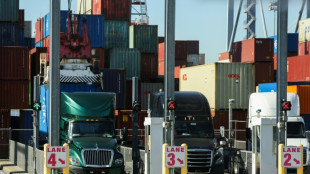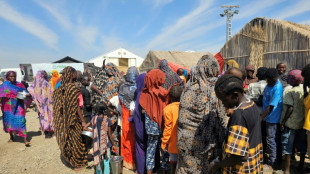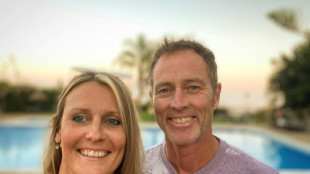
-
 Rocket re-entry pollution measured in atmosphere for first time
Rocket re-entry pollution measured in atmosphere for first time
-
Airbus ready to build two new European fighters if countries want

-
 Canada makes push to attract skilled migrants, including for defence
Canada makes push to attract skilled migrants, including for defence
-
US threatens to leave IEA if net zero focus remains

-
 Walmart outlines big AI ambitions as it reports mixed results
Walmart outlines big AI ambitions as it reports mixed results
-
Trump kicks off his 'Board of Peace,' as war clouds loom on Iran

-
 UK pubs to stay open late if home nations reach World Cup knockouts
UK pubs to stay open late if home nations reach World Cup knockouts
-
TotalEnergies in high-stakes French trial over climate change

-
 Bosnia probes fascist salutes at Croatian singer's concert
Bosnia probes fascist salutes at Croatian singer's concert
-
US and Israel issue dire warnings to Iran alongside US military buildup

-
 British public cheer Andrew's arrest with a smile and relief
British public cheer Andrew's arrest with a smile and relief
-
Argentine workers go on strike to protest Milei's labor reforms

-
 Nakai targets Olympic skating upset as 'skimo' makes debut
Nakai targets Olympic skating upset as 'skimo' makes debut
-
What we know about ex-prince Andrew's friendship with Epstein

-
 US trade deficit in goods widens to new record in 2025
US trade deficit in goods widens to new record in 2025
-
Oil extends gains on US-Iran tensions, stocks retreat

-
 Williams 'on the back foot' after missing Barcelona: Albon
Williams 'on the back foot' after missing Barcelona: Albon
-
Real Madrid submit evidence to UEFA in Vinicius racism probe

-
 Olympics rev up Milan's renewal but locals fear price to pay
Olympics rev up Milan's renewal but locals fear price to pay
-
Cardona Coll, Fatton win Olympic-debuting ski mountaineering sprint golds

-
 MSF will keep operating in Gaza 'as long as we can': mission head
MSF will keep operating in Gaza 'as long as we can': mission head
-
Russian Filippov wins first medal at Milan-Cortina Games for individual neutral athletes

-
 Italian Milan takes sprint honours at UAE Tour
Italian Milan takes sprint honours at UAE Tour
-
Dozens killed in jihadist attacks in northwest Nigeria

-
 Zimbabwe unbeaten in T20 World Cup after six-wicket Sri Lanka win
Zimbabwe unbeaten in T20 World Cup after six-wicket Sri Lanka win
-
Postecoglou admits taking Nottingham Forest post a 'bad decision'

-
 Switzerland's Fatton wins women's ski mountaineering sprint on Olympic debut
Switzerland's Fatton wins women's ski mountaineering sprint on Olympic debut
-
Kinghorn, Van der Merwe return for Scotland against Six Nations strugglers Wales

-
 Repsol says could boost Venezuela oil output over 50% in 12 months
Repsol says could boost Venezuela oil output over 50% in 12 months
-
UN says Israeli actions raise 'ethnic cleansing' fears in West Bank, Gaza

-
 Arteta tells faltering leaders Arsenal to harness Wolves 'pain' against Spurs
Arteta tells faltering leaders Arsenal to harness Wolves 'pain' against Spurs
-
Crowley gets nod for Irish as Prendergast drops out

-
 Unbeaten Swiss to meet Great Britain in Olympic men's curling semis
Unbeaten Swiss to meet Great Britain in Olympic men's curling semis
-
UK police arrest ex-prince Andrew on suspicion of misconduct

-
 Oil extends gains on US-Iran tensions, Europe stocks slide
Oil extends gains on US-Iran tensions, Europe stocks slide
-
Former prince Andrew, a historic downfall

-
 Sri Lanka post 178-7 against Zimbabwe ahead of T20 Super Eights
Sri Lanka post 178-7 against Zimbabwe ahead of T20 Super Eights
-
OpenAI's Altman tells leaders regulation 'urgently' needed

-
 US renews threat to leave IEA
US renews threat to leave IEA
-
Liverpool boss Slot says Isak in 'final stages of rehab'

-
 Airbus ready to build two new European fighter jets if 'customers' ask
Airbus ready to build two new European fighter jets if 'customers' ask
-
UN Sudan probe finds 'hallmarks of genocide' in El-Fasher

-
 Costelow starts, Hamer-Webb makes Wales debut in Six Nations clash with Scotland
Costelow starts, Hamer-Webb makes Wales debut in Six Nations clash with Scotland
-
Facing US warnings, Iran defends right to nuclear enrichment

-
 Ex-South Korea leader Yoon gets life in prison for insurrection
Ex-South Korea leader Yoon gets life in prison for insurrection
-
OpenAI's Altman says at India summit regulation 'urgently' needed

-
 British couple held in Iran sentenced to 10 years
British couple held in Iran sentenced to 10 years
-
West Indies ease past Italy to tune up for T20 Super Eights

-
 At least 16 killed after building collapses in Pakistan following blast
At least 16 killed after building collapses in Pakistan following blast
-
Summit photo op fails to unite AI startup rivals


Senegal eyes economic boom in oyster farming
The mangrove swamp near Joal-Fadiouth, a fishing village in southern Senegal, teems with oysters.
But hunting for shellfish treasure among gnarly tree roots in brackish water is a lot of work.
Thousands of people -- the vast majority of them women -- make a living from oysters in Senegal, usually at a small and informal level.
But experts say the tropical West African state has huge prospects for ramping up oyster output to far greater levels.
"Oyster production is falling short of its potential," said Boubacar Banda Diop, in charge of the oyster sector at Senegal's fisheries ministry.
The possible harvest, in terms of protein and money, could be high, say champions of the oyster.
About 40 percent of Senegal's population of 17 million people live below the poverty line, according to a World Bank metric. In a nation where fish is a traditional staple, the country also suffers from overfishing and food insecurity.
In 2017, farmers plucked about 15,600 tonnes of oysters from Senegal's mangroves, according to the United Nations Food and Agriculture Organization (FAO). They also gathered about 400 tonnes from oyster beds.
By comparison, the world's largest oyster producer China harvests about 3.5 million tonnes per year, according to the French research institute Ifremer.
- 'Enormous' prospects -
Senegal's government has a development plan for the oyster industry, while the FAO and the European Union are putting forward ideas for techniques and breeding programmes to enhance production.
A small business in the Somone lagoon south of Dakar has already begun to apply some of the project's recommendations.
"We have doubled our production capacity compared to last year, going from three to six tonnes per year," the head of the business, Khadim Tine, told AFP.
But such successes are rare -- and the hurdles for those who want to make the jump from artisanal to industrial-scale farming are daunting.
Mamadou Bakhoum, the head of an association of villages in southern Senegal, said high water salinity caused by climate change meant there were fewer oysters than before.
But, he said, "if people get serious about it, the potential for developing oyster farming is enormous."
- Environmental factors -
Increasing the productivity of oyster farming while protecting Senegal's mangroves poses another environmental challenge.
The habitat features plants and shrubs growing in shallow semi-salty water, protecting against coastal erosion and nurturing a complex and invaluable ecosystem. Mangroves are already under increasing threat in Senegal, as elsewhere.
Abdou Karim Sall, president of the Joal-Fadiouth Marine Protected Area, aims to help farmers cultivate oysters without spoiling the mangroves.
Wooden trestles are placed in the swamp with wires hanging between supports just above the waterline.
Spats -- strings of oyster larvae that grow into the shellfish -- then begin to develop on the wires.
Sall said the method protects the mangrove but also allows the women farmers to produce more oysters and earn more money.
Local NGOs in Joal-Fadiouth have helped several women oyster farmers to start using the technique.
Selling oysters fresh -- as opposed to cooked, as is usual in Senegal -- could also boost returns for farmers.
Industry figures say that a dozen fresh Senegalese oysters sell for the equivalent of between seven and nine euros ($7.70-8.20).
That's a price that puts fresh oysters way of out of reach for many in the country --- wealthy tourists would be the target market for an expanded industry.
To meet it would problems are cold storage, transport infrastructure and sanitation standards.
Expanding the oyster business to an industrial scale requires systems to monitor water quality, as oyster farms are prone to contamination.
For water quality alone, a budget of about 305,000 euros ($335,000) would be needed for the first decade, according to Diop's ministry -- a big ask in a developing country.
P.Costa--AMWN


